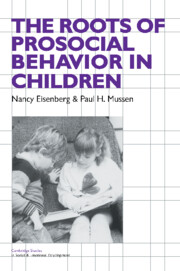Book contents
- Frontmatter
- Contents
- Preface
- 1 Introduction
- 2 Methodological and theoretical considerations in the study of prosocial behavior
- 3 Biology and prosocial behavior
- 4 Culture and prosocial behavior
- 5 “Person” variables and prosocial behavior
- 6 Socialization in the family
- 7 Socialization by agents outside the family
- 8 Cognition, role taking, interpersonal problem solving, and moral judgment
- 9 Emotional factors in prosocial behavior
- 10 Situational determinants
- 11 Conclusions
- References
- Name index
- Subject index
11 - Conclusions
Published online by Cambridge University Press: 31 December 2009
- Frontmatter
- Contents
- Preface
- 1 Introduction
- 2 Methodological and theoretical considerations in the study of prosocial behavior
- 3 Biology and prosocial behavior
- 4 Culture and prosocial behavior
- 5 “Person” variables and prosocial behavior
- 6 Socialization in the family
- 7 Socialization by agents outside the family
- 8 Cognition, role taking, interpersonal problem solving, and moral judgment
- 9 Emotional factors in prosocial behavior
- 10 Situational determinants
- 11 Conclusions
- References
- Name index
- Subject index
Summary
We have surveyed hundreds of studies. What do we know about the factors affecting the development of prosocial orientations and behaviors and the conditions that facilitate or undermine their development and expression? Some conclusions are relatively well established, based on a substantial body of research. Other conclusions must be drawn tentatively, because relevant investigations have yielded findings that are not consistent with each other. Still other issues, such as the interrelations of various influences (e.g., personal and situational factors) and their joint effects on prosocial functioning, have seldom been examined.
It seems appropriate to begin this concluding chapter with a summary of the robust, reliable findings, underscoring some of their implications. Some of the findings are so clear that we can make recommendations with regard to practical applications with confidence. For the most part, the research conducted in the last 12 years has served to reinforce our earlier conclusions in The Roots of Caring, Sharing and Helping. At the same time, new research has allowed us to analyze issues in more depth and to correct some prior misconceptions.
Of course, because no single determinant of prosocial behavior has anoverriding influence on behavior in all situations, our conclusions andrecommendations apply “in general,” with the qualifier of “other thingsbeing equal.” But, in reality, other things are almost never equal. Each antecedent functions as a part of a complex matrix of interacting factors that simultaneously exert their influences.
- Type
- Chapter
- Information
- The Roots of Prosocial Behavior in Children , pp. 150 - 159Publisher: Cambridge University PressPrint publication year: 1989

